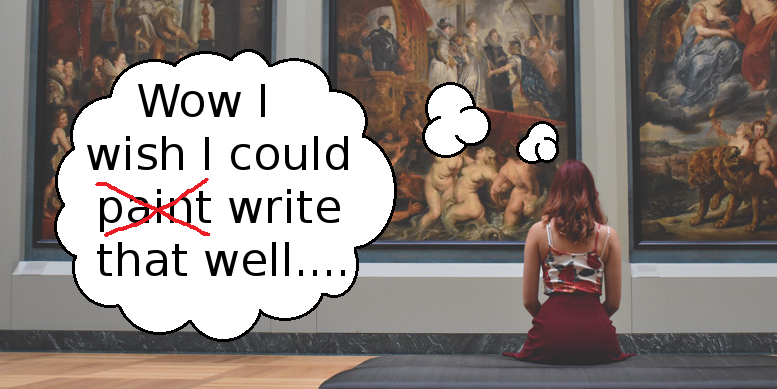Last week on Masterpiece Monday we saw how inside jokes between the reader and narrator can be effective at drawing us in. This week I’d like pull back and show off some examples of something that I know is hard for me to do: spice up the word “said.”
Whenever I’m writing, I want to get across in my reader’s head exactly how I’m visualizing the scene. So when two characters are having a conversation, I love to throw in “spiced-up versions” of the word “said.” Things like this:
“Oh you’re too much!” he laughed.
“Get down here right now!” she yelled.
“I hate you,” she spat.
But here’s the thing – most of the time, you don’t need to spice up the word “said.” Good writers, unlike myself, are able to convey how the characters speak without needing to resort to long verbs that could slow down the prose.
Here’s an example from John Green’s The Fault in Our Stars. It takes place just after Hazel and her mother arrive in Amsterdam and they flag down a taxi.
After getting our bags and clearing customs, we all piled into a taxi driven by this doughy bald guy who spoke perfect English—like better English than I do. “The Hotel Filosoof?” I said.
And he said, “You are Americans?”
“Yes,” Mom said. “We’re from Indiana.”
“Indiana,” he said. “They steal the land from the Indians and leave the name, yes?”
“Something like that,” Mom said.
Did you notice while you were reading? Just that one scene uses the word “said” five times… in a row!
Many editors would slice through most of them with their red pen, but I’m not sure they’d be correct in doing so. Yes, the author technically repeats the same word over and over, but it flows so well. If the author had instead used different verbs like “mumbled” or “guffawed,” or decided to commit the ultimate literary sin and use adverbs like “Mom said quickly,” then the scene would’ve been bogged down by needless words and syllables.
But it’s just one syllable/word, right? How much of a difference can it make? Subconsciously, quite a bit. The scene is supposed to be fast-paced, and any excess letters on the page will slow it down. We saw before how a longer action scene can take something fast and fun and make it boring, and the same goes for snappy dialogue as well.
I know that I’m tempted all the time to use other words besides “said” in my writing. And while sometimes it can be correct to do so, a lot of the time I use fancier “said” verbs as a crutch. The words the characters use and their personalities should dictate how they say things, not unnecessary description.
So the next time you’re scratching your head wondering what word to use in place of “said,” just try using “said.” If the same emotion you’re aiming for isn’t coming through, then maybe it’d be better to change the words coming out of the character’s mouth instead.
(Featured image via GAHAG, edited by me)

Comments are closed.